Japan Update 2014
Conference Summary
prepared by
Andrew Trolley, Volunteer, and the JASI staff
Photographs by Zach Dobson
EXECUTIVE SUMMARY
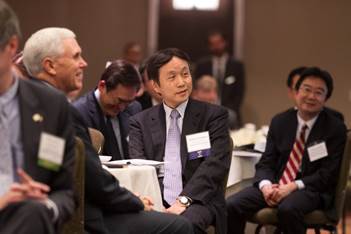
The Japan-America Society of Indiana (JASI) presented the Japan Update 2014 Conference on February 27, 2014 with the support of the Keizai Koho Center of KEIDANREN and the National Association of Japan-America Societies. The conference opened with remarks from JASI President and Subaru senior executive Tom Easterday. This was the third annual conference and attended by over 250 guests from Japan and across the country.
The overall message of the conference was upbeat and bullish on Japan and the Japan-US relationship. Japanese companies are continuing to invest in the US, and specifically in Indiana, based on a strong relationship and a desire for mutual prosperity. Governor Pence and Consul General Yoshida reminded attendees of the shared values and investment both sides have made over decades to nurture and grow that relationship.
Government and Industry panelists are overall optimistic on Japan’s prospects, while acknowledging some political and economic risks that require monitoring. The Japan-US alliance continues to be the cornerstone of peace and prosperity in the Asia Pacific region. The Obama administration is currently re-balancing towards Asia, as evidenced by recent high-level visits from both the US and Japan governments.
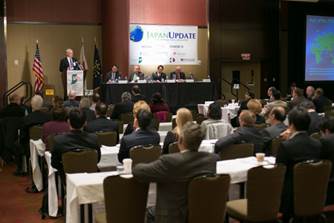 Shigeru Hayakawa, Senior Managing Officer of the Toyota Motor Corporation presented the Keynote Address. Toyota and other Japan-invested auto companies are upbeat on the prospects for 2014 automotive sales. New investments are being made and new technologies are under development. A common theme among suppliers involved steps being taken to secure and develop skilled human resources needed to meet requirements.
Shigeru Hayakawa, Senior Managing Officer of the Toyota Motor Corporation presented the Keynote Address. Toyota and other Japan-invested auto companies are upbeat on the prospects for 2014 automotive sales. New investments are being made and new technologies are under development. A common theme among suppliers involved steps being taken to secure and develop skilled human resources needed to meet requirements.
Outside automotive, there are proven examples of Indiana companies’ success with Japan. Those businesses considering or currently pursuing sales with Japan and Japan affiliated businesses heard encouragement and practical advice on developing relationships and positioning their products and services for success. Japan continues to be an attractive first overseas market thanks to its position in East Asia, protection of intellectual property, and strong contract governance.
JASI wishes to thank the distinguished speakers, moderators, and panelists, especially those traveling great distances, who helped make this 2014 Japan Update an important and relevant forum for promoting dialogue and cooperation.
The Japan Update 2014 Conference was made possible through the generous support of the Corporate Sponsors: AISIN; Cornerstone Environmental, Health and Safety; Duke Energy; Enkei America; GECOM Corporation; Honda Manufacturing of Indiana; Hoosier Energy; Indiana Economic Development Corporation; Indiana Packers Corporation; JP Morgan Chase; KYB Americas Corporation; NTN Driveshaft; Ogletree, Deakins, Nash, Smoak & Stewart, P.C.; Subaru of Indiana Automotive; TASUS Corporation; TOA (USA), LLS; Toyota Industrial Equipment Manufacturing; Toyota Motor Manufacturing, Indiana; Vectren Energy Delivery, and through the support of the Consulate General of Japan at Chicago, Indiana Economic Development Corporation, Indiana Japan Chamber, Indiana Manufacturers Association, and JETRO Chicago.
FULL CONFERENCE REPORT
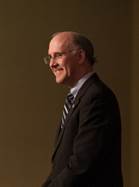 Introduction
Introduction
This was the third annual conference and attended by over 250 guests from Japan and across the country. Distinguished speakers and industry leaders shared their perspectives on key issues for Japan and the Asia-Pacific region and areas of investment, manufacturing, and trade within the Indiana-Japan partnership. The program began with a luncheon facilitated by Tom Easterday, President of JASI, Executive Vice President, Secretary, and Chief Legal Officer, Subaru of Indiana Automotive.
Welcome Remarks from The Honorable Mike Pence, Governor of Indiana
Welcome remarks were delivered by Indiana Governor, the Honorable Mike Pence. Governor Pence’s first trip last fall was to Japan, emphasizing the deep relationship between the State of Indiana and Japan. 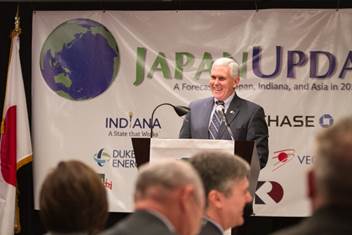 Over 250 Japan-related businesses employ more than 44,000 Indiana citizens. The Governor’s message focused on the common agricultural and manufacturing heritage shared by Indiana and Japan and a future of shared prosperity where the best is yet to come.
Over 250 Japan-related businesses employ more than 44,000 Indiana citizens. The Governor’s message focused on the common agricultural and manufacturing heritage shared by Indiana and Japan and a future of shared prosperity where the best is yet to come.
He recalled a visit to a business in Ohta City, Japan where a poplar, the Indiana state tree, had been planted and had grown very tall thanks to the daily watering from that company’s CEO. This experience carried into the Governor’s remarks on the continuing care and nurturing that the special relationship between Indiana and Japan requires and his announcement of new Japan Cultural Center and Gardens. Within the planned Gardens, will be a “Forest of Friends” where Japanese corporate partners will have an opportunity to plant a tree and the Japanese community in Indiana may find a little piece of home.
Welcome Remarks from The Honorable Masaharu Yoshida, Consul General of Japan at Chicago
The conference continued with remarks from the Honorable Masaharu Yoshida, Consul General of Japan at Chicago. Japan and the US share the same basic motivations including adherence to the rule of law, support of human rights, and the use of strategic diplomacy, and a special bond and trust. The strategic alliance between Japan and the US is more important than ever as the US is rebalancing towards the Asia-Pacific region.
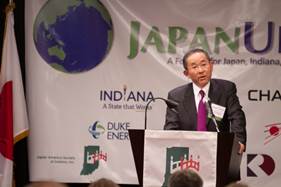 Japan and the US can focus on deepening our economic ties through initiatives including the TPP, or Trans-Pacific Partnership, which is a 12 nation trade agreement under negotiation. While TPP is receiving pushback at home in Japan, Prime Minister Abe’s economic policies are bearing fruit as GDP has increased 1.6% and consumption is rising. In short, Japan is back and now is the time to do more business with Japan. With a strong economy, Japan can do more to support peace and prosperity.
Japan and the US can focus on deepening our economic ties through initiatives including the TPP, or Trans-Pacific Partnership, which is a 12 nation trade agreement under negotiation. While TPP is receiving pushback at home in Japan, Prime Minister Abe’s economic policies are bearing fruit as GDP has increased 1.6% and consumption is rising. In short, Japan is back and now is the time to do more business with Japan. With a strong economy, Japan can do more to support peace and prosperity.
Keynote Address from Shigeru Hayakawa, Senior Managing Officer, Toyota Motor Corporation
The Keynote address was presented by Shigeru Hayakawa, Senior Managing Director, Toyota Motor Corporation, Japan. Thanks in large part to the efforts of Keizai Koho Center, Mr. Hayakawa traveled from Japan to share Toyota’s efforts to enrich life in America.
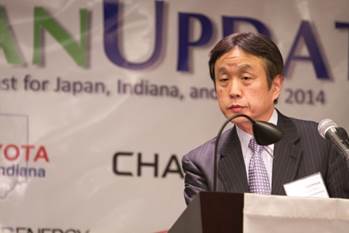 Over 50 years ago, people thought that Toyota was crazy to sell cars in America. However, 2013 was the best sales year since 2007 and SAAR of 16.1 million vehicles. Toyota is committed to benefitting communities where it does business. Toyota has continued to localize production, including production of Lexus ES350 sedans. Toyota employs 39,000 team members in 10 US plants and from last year consolidated Sales, Engineering, and Manufacturing into one North American company under the leadership of CEO Jim Lentz.
Over 50 years ago, people thought that Toyota was crazy to sell cars in America. However, 2013 was the best sales year since 2007 and SAAR of 16.1 million vehicles. Toyota is committed to benefitting communities where it does business. Toyota has continued to localize production, including production of Lexus ES350 sedans. Toyota employs 39,000 team members in 10 US plants and from last year consolidated Sales, Engineering, and Manufacturing into one North American company under the leadership of CEO Jim Lentz.
Toyota exported 130,000 vehicles from the US, a 5% increase year over year. From their factory in Princeton, Indiana, Toyota is exporting Highlanders to New Zealand, Australia, and Eastern Europe. TMMI also producing 100% of Highlanders for the US market. Toyota invested an additional $13 million at TMMI and added 200 new jobs. These exports underscores the importance of free trade to the health of the US economy. Mr. Hayakawa reaffirmed Toyota’s support to increase exports and investment in the US in terms if facilities, research, and human resources. Future success requires a “back to basics” approach based on values incorporated into The Toyota Way.
US engineers are working on new powertrains to reduce oil consumption and greenhouse gases and at the same time provide customers with the driving experience that meets their needs. Toyota is developing a full line of alternative fuel vehicles, including the hydrogen fuel cell vehicle that debuted recently at the CS Show. 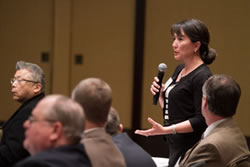
Toyota’s support for communities can also be seen through philanthropy including vehicle donations and countless volunteer hours from team members. Additionally, the Toyota Production System Support Center’s partnered with the St. Bernard project and other important civic groups to reduce lead-time for completion housing and serving meals.
Plenary Session: Japan – U.S. – Asia Overview
The Consul General’s address was followed by three panel discussions with distinguished speakers from government, banking, and industry: a Japan-US-Asia Overview, Indiana Successes with Japan, and Perspectives from Japan-Invested Automotive Suppliers in Indiana.
The first panel of the afternoon session, moderated by Peter Kelley of the National Association of Japan-America Societies, focused on the US-Japan relationship. The panel included Marc Knapper, Director at Office of Japanese Affairs, U.S. Department of State and Morgan McGrath, Head of International Banking, JP Morgan Chase. Steve Akard, Vice President and General Counsel, Indiana Economic Development Corporation, followed with remarks on Indiana and Japan Economic Partnerships.
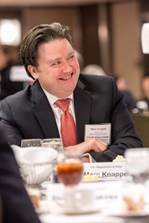 Mr. Knapper described the US-Japan strategic alliance as the cornerstone of peace and prosperity in the Asia-Pacific region. The alliance is not limited to a security-related mutual defense treaty, but also includes the full breadth of economic, science, technology, energy, and people-to-people relationships we share. 2013 was a pivotal year. In February, Prime Minister Abe came to Washington, D.C. with an election plank to strengthen the US-Japan relationship. The Prime Minister has demonstrated the will an ability to deliver on pledges and get things done. October marked the first time that the Secretaries of State and Secretaries of Defense met to review defense guidelines to preserve peace and prosperity. These guidelines were last reviewed in 1997 and work is underway to develop what we want to have in place in 2020 and 2030.
Mr. Knapper described the US-Japan strategic alliance as the cornerstone of peace and prosperity in the Asia-Pacific region. The alliance is not limited to a security-related mutual defense treaty, but also includes the full breadth of economic, science, technology, energy, and people-to-people relationships we share. 2013 was a pivotal year. In February, Prime Minister Abe came to Washington, D.C. with an election plank to strengthen the US-Japan relationship. The Prime Minister has demonstrated the will an ability to deliver on pledges and get things done. October marked the first time that the Secretaries of State and Secretaries of Defense met to review defense guidelines to preserve peace and prosperity. These guidelines were last reviewed in 1997 and work is underway to develop what we want to have in place in 2020 and 2030.
TPP is a marquee effort and historic opportunity for 12 countries representing 40% of the world’s GPD and the two largest free market economies. It is important for Japan and the US to show leadership and lock arms for multi-lateral negotiations. We expect to see new export opportunities with Japan and a link to the Asia-Pacific region. Japan and the US are natural friends and partners. Indiana benefits as a good place to invest.
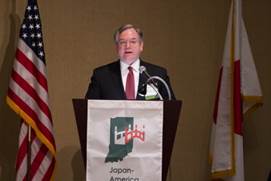 Mr. McGrath explained that JP Morgan Chase is bullish on Japan. Japan is at a unique moment and we expect increased economic activity between the US and Japan. Japan-related businesses in the US employ over 600,000 American workers and Japan is 4th largest buyer of American-made goods. The Japanese economy is showing signs of a self-sustaining recovery and our US clients are reacting positively. Examples include those involved in electronics, pharmaceuticals, medical devices, retail/lifestyle and real estate. The Japanese banking system is rich in capital and Japanese industry demonstrates strong contract enforcement.
Mr. McGrath explained that JP Morgan Chase is bullish on Japan. Japan is at a unique moment and we expect increased economic activity between the US and Japan. Japan-related businesses in the US employ over 600,000 American workers and Japan is 4th largest buyer of American-made goods. The Japanese economy is showing signs of a self-sustaining recovery and our US clients are reacting positively. Examples include those involved in electronics, pharmaceuticals, medical devices, retail/lifestyle and real estate. The Japanese banking system is rich in capital and Japanese industry demonstrates strong contract enforcement.
There have been questions regarding domestic demand. Is this simply a front loading of consumption prior to implementation of the higher tax in 2014? We think we see underlying strength, for example, in shipments of capital goods that indicate an ability to weather the upcoming tax hike. There are headwinds, including taxes and growth in the US and emerging markets. However, we see US growth continuing this year, China to continue at about their current pace and slight recovery in the EU. Overall, we are bullish on Japan’s prospects. The Bank of Japan is expected to be consistent in supplying economic stimulus while the growth in bank lending and credit usually points to economic expansion.
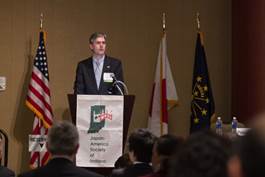 In his remarks, Mr. Akard underscored the importance of the Japan-Indiana relationship. In Indiana, Japan is the largest foreign source of jobs. Indiana is first among Midwestern states in the number of workers employed by Japan-affiliated companies and among the top 5 nationally. Indiana continues to attract business with Japanese partners. Indiana has received the investment equivalent of the Honda plant in Greensburg in the last two years.
In his remarks, Mr. Akard underscored the importance of the Japan-Indiana relationship. In Indiana, Japan is the largest foreign source of jobs. Indiana is first among Midwestern states in the number of workers employed by Japan-affiliated companies and among the top 5 nationally. Indiana continues to attract business with Japanese partners. Indiana has received the investment equivalent of the Honda plant in Greensburg in the last two years.
The Indiana Economic Development Council will continue to support Japanese partners and make them feel welcome to do business in Indiana. We will continue our presence in Japan with an office and have added Mr. Rick Pease and Paul R to our team to advance relationships with Japanese companies in the state and see them prosper. We believe in two-way trade and investment and the IEDC will encourage those wanting to do business in Japan.
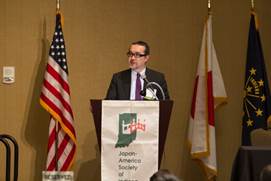 Panel 2: Indiana Successes with Japan
Panel 2: Indiana Successes with Japan
The second afternoon session, moderated by Ichiro Sone, Chief Executive Director of JETRO-Chicago, focused on Indiana companies who are successfully doing business in Japan and with Japan-affiliated companies. The panel included Bob Mason, Vice President and International Sales Manager, Ford Meter Box; Mark Miller, President, Cornerstone Environmental, Health and Safety; and Sachin Shah, Senior Director, International, Vera Bradley.
Mr. Sone expressed his gratitude for participating in today’s conference and for the opportunity to share examples of local companies’ success doing business in Japan. JETRO is a non-profit government organization tasked with promoting external trade. JETRO has a long history with 73 overseas offices and 40 offices in Japan. Mr. Sone emphasized that for those wishing to do business in Japan, JETRO is the place for you. Now is a unique time in Japan. The Japanese economy is recovering through the application of Prime Minister Abe’s economic policies, the stock market was up 57% in 2013, and Japan was awarded the 2020 Summer Olympics. In short, Japan is back.
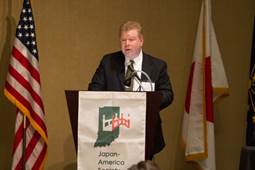 Mr. Mason opened with a brief history of Ford Meter Box as a family-owned company in business for 116 years. Ford produces a range of parts and service products to water utilities world-wide at manufacturing facilities in Indiana and Alabama. In the US alone, it is estimated that $247 billion in investment is required to upgrade water utilities, many of which were built 50-100 years ago. Many of Japan’s modern utilities were constructed in the 1960’s and Ford Meter Box has been doing business there for approximately 25 years.
Mr. Mason opened with a brief history of Ford Meter Box as a family-owned company in business for 116 years. Ford produces a range of parts and service products to water utilities world-wide at manufacturing facilities in Indiana and Alabama. In the US alone, it is estimated that $247 billion in investment is required to upgrade water utilities, many of which were built 50-100 years ago. Many of Japan’s modern utilities were constructed in the 1960’s and Ford Meter Box has been doing business there for approximately 25 years.
Ford’s involvement with JETRO and a senior trade advisor in the early 1990’s helped position Ford Meter to become successful in the Japan market. Initially, we partnered with Maeda Valve, who wanted to expand their business in repair clamps, where Ford Meter has expertise. Ford then partnered on outside sales calls using Ford’s own Japanese-speaking sales staff. Key lessons learned included creating an export department internally that was completely separate from domestic sales, using their own Japanese-speaking sales staff, and modifying products to suit the Japanese market. Mr. Mason concluded with his appreciation of support from JETRO, JASI, and the state of Indiana.
 Mr. Miller shared the journey of Cornerstone Consulting, which was founded 16 years ago and made its breakthrough by supporting a Tier 1 automotive supplier. While producing Gantt charts, compiling data and comparing to Japanese versions of materials, they learned the patience and consensus building skills that ultimately resulted in success. The results experienced at this initial facility paved the way for an invitation to support the client’s other locations.
Mr. Miller shared the journey of Cornerstone Consulting, which was founded 16 years ago and made its breakthrough by supporting a Tier 1 automotive supplier. While producing Gantt charts, compiling data and comparing to Japanese versions of materials, they learned the patience and consensus building skills that ultimately resulted in success. The results experienced at this initial facility paved the way for an invitation to support the client’s other locations.
Lessons learned and advice to others include: translating business cards into Japanese, creating company materials in English and Japanese, success at one company can lead to business at others, and become involved in JASI. JASI events offer excellent learning and networking opportunities. Once in a business relationship, Mr. Miller advised to align your company with trusted resources, such as translator and other service providers, whose quality will reflect on your company. Above all, Miller advised to place relationships above the pursuit of revenue.
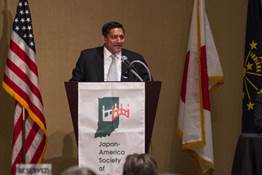 Vera Bradley is an example of an Indiana company that launched a successful presence in Japan and is working towards opening its own retail stores in order to pursue its longer term goals. Sachin Shah explained that Japan was the company’s first international market. The management team selected Japan for its role as a trendsetter in East Asia, sophistication of its shoppers, and shoppers’ attitudes towards product value and quality.
Vera Bradley is an example of an Indiana company that launched a successful presence in Japan and is working towards opening its own retail stores in order to pursue its longer term goals. Sachin Shah explained that Japan was the company’s first international market. The management team selected Japan for its role as a trendsetter in East Asia, sophistication of its shoppers, and shoppers’ attitudes towards product value and quality.
With the support of JETRO, the Vera Bradley preparation traveled to Japan and met with department stores and fashion editors to better understand the opportunity and retail environment. Bradley moved forward with a soft launch using pop-up stores inside Isetan Shinjuku, one of the largest volume department stores in the world. In the midst of readying for the hard launch planned for April 2011, the tragic earthquake and resulting tsunami occurred in North Eastern Japan. The Vera Bradley team consulted with advisors at JETRO and their retail partner in Japan, ultimately deciding that it was not the time to back up.
Mr. Shah recommended that those exploring Japan as a market should choose their partners carefully and to expect longer lead-time to develop relationships compared to the US. Ultimately, Vera Bradley wants to open its own Japanese stores with their own staff in order to craft a unique identity.
Panel 3: Perspectives from the Japan-Invested Automotive Suppliers in Indiana
The final panel, moderated by Mark Rechtin of Automotive News, focused on Tier 1 automotive companies affiliated with Japan with or doing business with Japan-affiliated customers. The panel included Rick Merkel, Executive Vice President and COO, Enkei America; Jeff Zike, Vice President of Manufacturing, NTN Driveshaft; Masayasu Saito, President and CEO, Aisin Holdings of America; and Scott Turpin, Executive Vice President, also of Aisin Holdings of America.
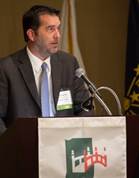 Mr. Rechtin began with an update on the US automotive industry. Retail sales have caught up with 2007 levels and are forecast to exceed them in 2014. The view that the market is strengthening is supported by data indicating that 40% of vehicles in operation are over 11 years old and that the age of vehicles being traded-in is increasing. Contrary to some popular views, Generation Y customers want to be car buyers. The issue, however, is how those buyers will afford their vehicles. Other issues to watch include an increase in amount of auto loans with terms of 72 months or longer and new investments in facilities outside the US, such as the new Honda plant in Mexico.
Mr. Rechtin began with an update on the US automotive industry. Retail sales have caught up with 2007 levels and are forecast to exceed them in 2014. The view that the market is strengthening is supported by data indicating that 40% of vehicles in operation are over 11 years old and that the age of vehicles being traded-in is increasing. Contrary to some popular views, Generation Y customers want to be car buyers. The issue, however, is how those buyers will afford their vehicles. Other issues to watch include an increase in amount of auto loans with terms of 72 months or longer and new investments in facilities outside the US, such as the new Honda plant in Mexico.
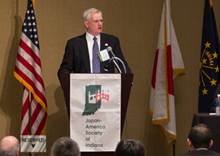 Mr. Merkel shared an overview of Enkei’s history and growth in Indiana, its first overseas operation. Although Enkei operates facilities globally, Enkei’s DNA is expressed through common colors, incorporation of plants and greenery, and consistent quality. Enkei has adapted to changes in the market since the Indiana facility opened, increasing volume based on customer demand and changing preferences for larger and larger wheels.
Mr. Merkel shared an overview of Enkei’s history and growth in Indiana, its first overseas operation. Although Enkei operates facilities globally, Enkei’s DNA is expressed through common colors, incorporation of plants and greenery, and consistent quality. Enkei has adapted to changes in the market since the Indiana facility opened, increasing volume based on customer demand and changing preferences for larger and larger wheels.
Looking towards the future, two areas Enkei North America is focused on are remaining cost competitive and attracting and retaining talent, specifically in southern Indiana. The issue of human resources was echoed by others located in the same area.
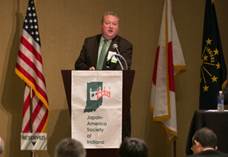 Mr. Zike explained the beginnings of NTN Drivetrain in Japan in 1918. Headquartered in Osaka, NTN has grown to over 22,000 employees worldwide, with CV joint operations in Columbus, Indiana. NTN has been approached by potential new customers, such as VW and BMW, however, the facility is at capacity. Rather than investing in additional capital equipment and buildings, NTN is pursuing manufacturing partnerships in order to take on new business and satisfy demand.
Mr. Zike explained the beginnings of NTN Drivetrain in Japan in 1918. Headquartered in Osaka, NTN has grown to over 22,000 employees worldwide, with CV joint operations in Columbus, Indiana. NTN has been approached by potential new customers, such as VW and BMW, however, the facility is at capacity. Rather than investing in additional capital equipment and buildings, NTN is pursuing manufacturing partnerships in order to take on new business and satisfy demand.
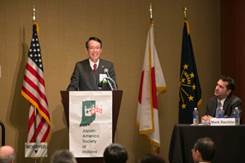 Mr. Saito and Mr. Turpin spoke on Aisin’s mission and product development, which extends beyond the automotive parts which it is best-known for. Aisin operates 180 companies in 20 countries and strives to be an “irreplaceable global partner”. The Seymour, Indiana facility opened in 1987 to supply Camrys built at Toyota’s Georgetown, Kentucky assembly plant. Since then, the Seymour plant has grown steadily with customer demand. One of the challenges that Aisin and others are responding to is a customer expectation for supplier R&D to be located closer to US manufacturing plants.
Mr. Saito and Mr. Turpin spoke on Aisin’s mission and product development, which extends beyond the automotive parts which it is best-known for. Aisin operates 180 companies in 20 countries and strives to be an “irreplaceable global partner”. The Seymour, Indiana facility opened in 1987 to supply Camrys built at Toyota’s Georgetown, Kentucky assembly plant. Since then, the Seymour plant has grown steadily with customer demand. One of the challenges that Aisin and others are responding to is a customer expectation for supplier R&D to be located closer to US manufacturing plants.
As a group, the panelists were optimistic on their automotive prospects, but share a common desire to develop and retain skilled resources and find ways to meet increased customer demand and expectations.
Closing
The 2014 conference was closed with remarks from Tom Easterday and was followed by a networking reception. JASI wishes to thank the speakers, panelists, and moderators, especially those traveling great distances, who helped make the 2014 Japan Update conference a success. JASI also wishes to recognize its volunteers and the staff of the Hyatt Regency Indianapolis for their support of today’s proceedings.
JASI once again thanks the Japan Update 2014 Corporate Sponsors: AISIN; Cornerstone Environmental, Health and Safety; Duke Energy; Enkei America; GECOM Corporation; Honda Manufacturing of Indiana; Hoosier Energy; Indiana Economic Development Corporation; Indiana Packers Corporation; JP Morgan Chase; KYB Americas Corporation; NTN Driveshaft; Ogletree, Deakins, Nash, Smoak & Stewart, P.C.; Subaru of Indiana Automotive; TASUS Corporation; TOA (USA), LLS; Toyota Industrial Equipment Manufacturing; Toyota Motor Manufacturing, Indiana; Vectren Energy Delivery.
And the supporting organizations: Consulate General of Japan at Chicago, Indiana Economic Development Corporation, Indiana Japan Chamber, Indiana Manufacturers Association, and JETRO Chicago.
Japan Update 2014 Photo Gallery


